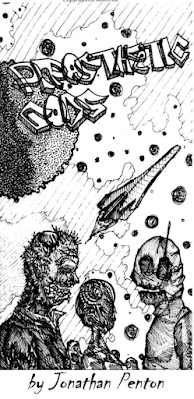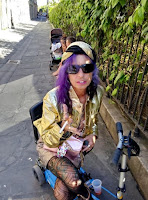Dark material can be difficult for some readers; work that is violent, even when it rhymes, can feel as if the song itself, the poem itself, the art itself is an assault. Those familiar with contemporary genres in music or cinema are no strangers to violence in art; however, not every reader of poetry is accustomed to violence as a thematic element in a chapbook. A reader who is disabled, or is sensitive to disability justice, will notice the book’s title Prosthetic Gods, as disabled folk who live with prosthetic aids are often socially marginalized. While the title refers to a remark made by Freud, and the remark is included in the book’s initial pages, the title itself serves as a warning of this chapbook’s raw content.
Of course, those familiar with punk as a multi-genre philosophy, will also recognize the energy here. The black and white cover features a delicate drawing of subtly grotesque figures apparently in conversation during a rocket launch, and the volume of less than thirty pages uses a nice weight of paper—a testament to the work’s second edition status. Also, the spine is perfect bound, which is unusual in a book of such brevity. One wonders maybe if the first edition didn’t have that wonderful copy shop at midnight look, crooked stapling and all.
The eight titles of the poems also indicate a punk sensibility in this work, with the opening title being “First Mind Buried”, although an untitled poem precedes it. Indeed, Penton’s punk sensibility becomes revealed in this poem’s fifth line “cheap fucks who rent their stolen suits”(6), and there’s an odd use of taboo language through the volume. The punk genre makes full use of impolite terms, but what’s curious is how in “Sin of the Calf” (10), Penton eliminates the vowel to write “g-d” but also uses “fucking” in the same line. There’s no particular spiritual reverence otherwise present in the poem—or the book itself—and punk was notable for its use of deliberate irreverence.
There’s lots of use of impolite biology in this work; the prologue poem’s longest line is “your ink a mix of sweat, tears, vomit, and blood” and the writing grows increasing in violence, with perhaps a culmination of sorts in a section titled “Maror”. There’s four poems, or sections on separate pages under the title, with the last of these beginning with the rather elegant line “Venus walks among us, invisible and stalking”(14); however, this is not a lush and romantic symbol, but a destructive one who “murders their parents” and continues on with a horrific litany of intimate destruction.
While some readers might dismiss the work as merely the sort of punk porn posture assumed by many practitioners of the genre, there’s ample evidence of horror genre: a poem dedicated to Stephen King involves domestic violence and a nascent mass shooter, and the violence of the poems lends itself well to that genre. Yet, the repeated use of unsavory biologic imagery goes further than the plot of a regular person beset by demons. In “Don’t Let me Give You a Title”, the poem takes a kind of Prufrock journey, “You move smoothly, easily/among these discharged minds/their walls of blood and puke”(20) with the poet’s response being “but you feel more you than ever”. This is not the writer witnessing otherness around him, but rather the writer’s discovery of his own otherness in the least attractive aspects of those he encounters.
While this work may not be an overt testimonial to the author’s identity as other-minded, or neurodivergent, Penton’s participation in a panel on neurodivergence at AWP might be. In the realm of ND activism, there’s debate about which characteristics are also Disability or Crip issues, with some disabled people even objecting to Crip as a title. Nonetheless, the familiarity with the less-than-glamorous aspects of our biology is a fat realm in disability discussion, and has been weaponized against disabled people in a variety of ways in our culture. Just as classical punk was a genre-crossing philosophy, and as disability crosses all social castes among us, experiencing Penton’s chapbook is a visit to both of these realms in an intersection beyond sexual identity alone, or horror alone. Perhaps Penton’s poems here might find welcome if viewed as CripPunk, an energetic arts consideration which seeks revisionist historical acknowledgement of disability in classically accepted artists. While disability in the arts is ever uninvited, and occasionally tokenized, in the literary culture, Penton makes no apologies for his rage: “Let me suffer without any comforts/And the lies that you tell to make your lies worth living/Can rot with the flesh of our culture”(26). The rage of the disabled has almost come within earshot of the wider culture in these years since the beginning of COVID; the rage against the machines that tout a false narrative of normalcy are now coming from voices previously marginalized into invisibility. Our news cycles ever display yet more ugly from the abled towards everything around them, a genuine horrorshow from which literary horror seems a calm respite. Penton’s poetry here bridges the prosaic horror of lives thought to be ordinary, and does so with an artful mix of vernacular language and an elevated ear.
~*~
Biography: Su Zi is a poet/writer and artist/printmaker and edits, designs and constructs the eco-feminist poetry chapbook series Red Mare.
Publications include poetry, essays, stories and reviews that date back to pre-cyber publishing, including when Exquisite Corpse was a vertical print publication, and a few editions of New American Writing. More recent publications include Red Fez, Alien Buddha, and Thrice. A resident of the Ocala National Forest, with a dedicated commitment to providing a safe feeding respite for wild birds, and for a haphazard gardening practice that serves as a life model for all aspects of her work.



Su Zi, thank you so much for taking such a deep dive into this work. Prosthetic Gods was published in 2008 by Rane Arroyo of New Sins Press. After he passed, I re-self-published it in 2013, creating the Second Edition, which is very similar to the First. I don’t think I’ve read the book since then, so this is a wild ride for me. It’s a great honor to see Prosthetic Gods re-enter the discourse.
ReplyDelete“g-d” was definitely tongue-in-cheek; I believe it was not capitalized. Reverence for the imaginary.
When I wrote this book, I had never been on social media, and had no familiarity whatsoever with the discourse surrounding what is now called disability. In fact, if you called me disabled in 2008, I think I would’ve disagreed, though I was open about having bipolar disorder. I now know that being called disabled is an invitation into a community, but back then, I only thought in terms of mental illness. As you point out, I did recently give a talk at the AWP Conference on my life as a neurodivergent person, a word I did not know in 2008.
All this to say that seeing this chapbook placed in the context of contemporary disability discourse is a trip. I’m delighted and a little dumbstruck (228 words is dumbstruck). I’ll be thinking about this one for a while.